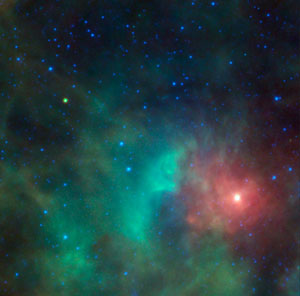Reply To:
Name - Reply Comment
 NASA camera snaps image of the potentially hazardous near-Earth object known as 1998 KN3 as it makes its way past the Orion Nebula.
NASA camera snaps image of the potentially hazardous near-Earth object known as 1998 KN3 as it makes its way past the Orion Nebula.
If you spent your time worrying about the number of asteroids and comets getting relatively close to our planet, you likely wouldn't log much sleep given that astronomers now have detected more than 10,000 so-called near-Earth objects (NEOs) flying through space.
What we're talking about is an assortment of objects varying in size -- from a few feet to as wide as 25 miles in diameter -- that approach within about 28 million miles of Earth's orbit. But while the risks of a planetary collision exist, the probability is low. At least for now.
Still, it makes for fun watching. The latest NEO to command attention is a beaut'. NASA's Wide-field Infrared Survey Explorer snapped this image of 1998 KN3 as it zipped past the Orion Nebula, some 1,500 to 1,600 light-years from Earth. In the picture, you can make out the asteroid as the yellow-green dot at the picture's upper left. NEO 1998 KN3 is fairly big, about .7 mile in diameter. That puts it in a select category, as only about 10 percent of NEOs measure larger than six-tenths of a mile.
The total numbers of NEOs likely will grow as scientific detection equipment gets more sophisticated. These sundry asteroids and comets have been out there, but it's only recently that we were able to find them. For instance, the first NEO was identified in 1898, but only 500 got logged by astronomers over the next 100 years. It was only after NASA's NEO Observations program got underway in 1998 that serious numbers were detected.
(Source : news.cnet.com)